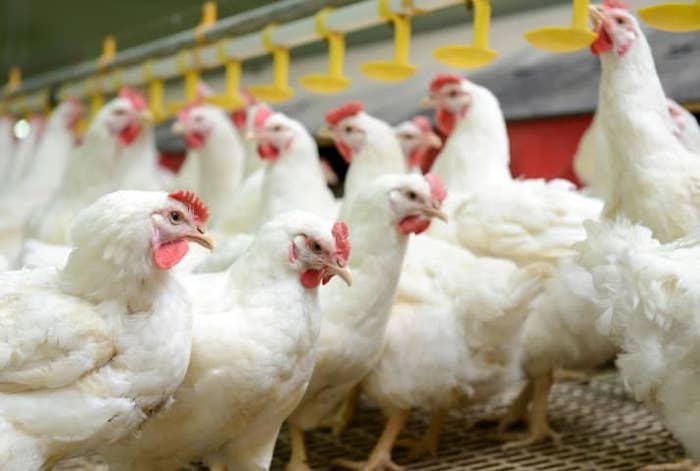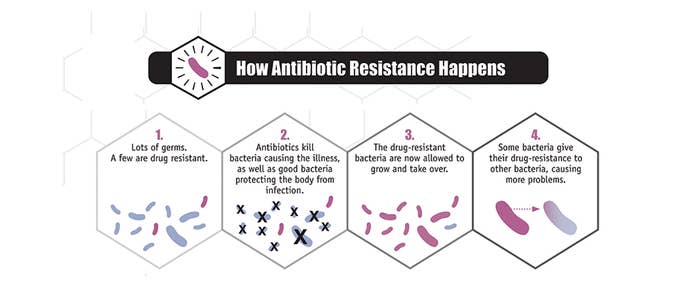
If there is a company that is pioneering new practices in poultry farming to phase out the use of antibiotics, it would not be Sanderson Farms.
Challenging the consensus of scientists, the CEO of the third biggest chicken producer said that the use of antibiotics to treat farm animals is not contributing to the rise of resistance to the drugs.
"There is no sound science that proves that by using antibiotics in animal agriculture that you create disease-resistant bacteria," CEO Joe Sanderson told investors earlier this month.
Mississippi-based Sanderson Farms has held its position to not withdraw antibiotics from its farms while other major producers make varying commitments to cut their use. Tyson said it will eliminate human antibiotics from its flock this year, and Pilgrim's Pride said about 24% of its chickens are raised without them.
Public health officials and the White House have voiced serious concerns that overuse of these vital medicines is contributing to the rise of bacteria that are resistant to them, and the CDC calls it "one of the world’s most pressing public health problems."
Many agricultural giants have come under fire for giving persistent, low doses of antibiotics to animals in order to promote weight gain. (Scientists don't fully understand why these drugs boost growth.) Sanderson claims the company only uses the drugs to prevent illness — it injects the drug bacitracin along with vaccines into chicken eggs to kill salmonella — and to treat animals that become sick, according to guidance from the FDA.
While the CDC estimates 20% of drug-resistant infections in people are caused by infection from food and animals, Sanderson Farms CFO Mike Cockrell told BuzzFeed News, "The science simply doesn't support the notion that what we're doing on the farm is contributing to the development of antibiotic resistant bacteria in humans."
But scientists like Tara Smith, a public health professor at Kent State University, say that's false. Public health professionals have been concerned about this for decades, she said, citing a 1976 paper about antibiotic use in agriculture, and recent research linking bacteria from chicken to urinary tract infections.
Smith told BuzzFeed News while bacitracin, the antibiotic that Sanderson Farms uses, is not considered essential in human medicine, its use in agriculture can still drive resistance to other critical antibiotics. The bottom line, she said: "Any use of antibiotics can lead to resistance."
Cockrell's comment echoes a statement Sanderson Farms released in January called "The Science of Antibiotics in Poultry," which said: "The preventative use of antibiotics in food animals has not been shown to harm human health." It cited a study funded by pharmaceutical companies that was authored by Tony Cox and Douglas Popken in Risk Analysis, a journal edited by Cox. Cox's firm has also done work for the Pork Board, an organization that promotes the meat, and for Phillip Morris.
Some producers and researchers, Smith said, are exploiting a weakness in the chain linking the development of resistant bacteria on farms to sicknesses in humans. The bacteria can spread from animals to farm workers, to people who come into contact with the workers, and so forth, and years can pass before anyone gets sick. So "the infection can be hard to link back to farms," she said.
While Sanderson's statement "contradicts almost all scientific evidence," Smith said, "They can use that as an out because we don't have that smoking gun."

Antibiotic resistant germs emerge when drugs are used — on animals or humans — killing bacteria except those that are resistant to the drug, according to a CDC resource called "Antibiotic Resistance from the Farm to the Table." Those resistant bacteria then multiply and can contaminate food when animals are slaughtered and processed.
Cockrell said Sanderson doesn't deny the rise of drug-resistant bacteria — "It's like climate change, there is absolutely no argument about that anymore," Cockrell said.
However, he contends that it's human overuse, not animal use, of antibiotics that is the leading factor in creating resistance, and maintains that Sanderson already complies with the FDA's tightened guidance.
The message the company gives its shareholders, however, emphasizes the need to use these drugs to continue operating as "a low-cost producer." Earlier this year, it told stockholders that raising chickens without antibiotics leads to "higher bird morbidity and mortality rates, lower live weights (because sick birds convert feed to weight less efficiently), longer growing times, lower yield, and requires more feed, water, and energy."
"We believe that if we discontinue the preventative use of antibiotics at this time," it continued, "our customers may seek alternative, lower cost suppliers."
Sanderson Farms also pointed to an oversupply of antibiotic-free chicken, and said most cuts besides the breast (such as wings, tenders, and dark meat) are not marketed as antibiotic-free and end up sold at conventional prices despite the higher cost of production.
Here's Sanderson's full quote from the Goldman Sachs Global Staples Forum:
... It was the European experience when they took antibiotics out of use in their flocks that their birds came to the plant with more salmonella, more E. coli, more campylobacter and more listeria. And that's something we've been working to reduce for 25 years. We want less salmonella. And also we went outside of our company and talked to some other people about the ethics of this and what this meant about not taking care of animals and what it cost, and what – we wanted to know the science of it. This antibiotic-resistant bacteria, where is the science about this? And we just did not get the answer that there is no sound science that proves that by using antibiotics in animal agriculture that you create disease-resistant bacteria. So that's how we landed.
